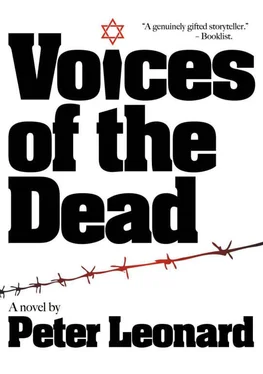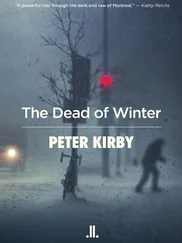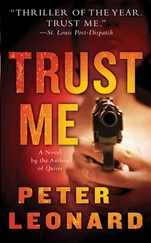“Surprise us? I almost had a heart attack. Where are your things?”
“This is it.”
“Esther will take you to Hudson’s; it’s a department store. You’ve never seen anything like it.”
“I’ve never seen anything like any of this.”
“You like baseball, Harry? That’s right, you don’t know from baseball. I’m going to take you to see Hank Greenberg, greatest ballplayer in the world.”
“Harry, you’re going to like it here,” Esther said. “We can buy fruit and vegetables even in winter.”
“How about apples?” Harry said.
“As many as you want.”
“You hungry, Harry? Of course you are. Esther, get him something to eat.”
It didn’t take any time, Harry fell in love with American girls and baseball, playing in the street and going with his uncle to see the Tigers. He fell in love with the pickles from Grunt’s market on Dexter, and television, watching Roy Rogers and Gene Autry and The Milton Berle Show . He loved going to movies at the Avalon Theater and going to Boesky’s and Darby’s for lunch and dinner. But mostly he liked the fact that in America you could do or be anything you wanted.
Munich, Germany. 1971.
9:15 the next morning, Harry was having breakfast, studying the grainy photographs of Ernst Hess’ estate taken with a long lens. The house was big, a classic Tudor with dark exposed timbers, with stucco walls, steep roof lines and half a dozen tall chimneys. The windows were rectangular, with one- and two-storey bays and decorative leaded glass panes.
It was more mansion than house, ten photos showing the front, sides and rear, and the gardens, pool and tennis court behind it. There were several shots of Hess taken at different times. Hess in business attire, coming out the front, getting into a black Mercedes, Rausch, the linebacker he’d thrown over the table at Les Halles in Washington DC, standing in the frame. Hess in bathing trunks, climbing out of the pool, gut hanging out. Hess in the garden with a tall, slim dark-haired girl, identified as his daughter, Katya, age seventeen. There were also photos of Hess AG, the Zeppelin factory, two airplane hangars and a three-storey building built on an alpine meadow outside the city, the snow-capped Bavarian Alps in the background. And a final shot of Hess’ apartment building in downtown Munich.
The phone rang, Berman saying he had the merchandise Harry ordered. Harry took the elevator down and met him in the lobby. Berman handed him a rectangular package wrapped in brown paper that weighed about four pounds. Harry handed Berman a hotel envelope that had five hundred-dollar bills in it, thanked him and went back to his room.
Harry sat on the bed and pulled the tape off, unwrapped the paper and took out the gun, an untraceable blue-black Colt .38 Special, and ten rounds. He picked up the gun, pushed the latch forward and the cylinder popped open. The chambers were empty. He anchored the butt of the revolver against his belt, muzzle pointing at the floor. Held the cylinder with his right hand and fed rounds into the chambers, leaving one empty so he wouldn’t shoot himself by accident. He swung the cylinder closed with his left hand and heard it click. Harry thought about what he was going to do. Knew what Sara, the anti-war activist, would have said. She’d driven to Kent State on May 5, 1970 to join the protest after National Guardsmen fired sixty-seven rounds into a crowd of students in thirteen seconds, killing four, wounding nine. He took out her picture he carried in his wallet, a snapshot from a summer party, staring at his daughter’s innocent face, getting angry, thinking what he was going to do was justified. He flipped the wallet closed and put it back in his pocket.
Harry rented a BMW 2002 a block away from the hotel on Prannerstrasse. Drove north out of the city and arrived at the Hess estate thirty minutes later. The house was set behind a brick wall on ten wooded acres. Hess’ neighbors’ homes were on similar-sized lots spread throughout the rolling hills. He parked the BMW, the car hidden by trees unless you were driving by slowly looking for it. He got out, closed the door, and walked across the road, moving along the six-foot-high wall bordering Hess’ estate, following it as it curved into the woods.
He reached up and grabbed an oak limb and hoisted himself up on top of the wall, dropped to the ground on the other side. He picked his way through heavy timber and thick brush, and came out in front of the massive Tudor that had to be ten thousand square feet. There was a circular drive and two black Mercedes sedans parked near the front door.
Harry moved through the trees on the west side of the house, catching glimpses of the wide sweeping lawn and gardens, the swimming pool and pool house on the opposite side of the property, tennis court just ahead.
He could hear voices and see movement behind the fence. Harry crept up close to the court, crouching at the edge of the trees. He watched Hess, in tennis whites, blast a forehand at the girl from one of the photographs, a tall thin teenager whose moves seemed awkward, but she had a two-handed backhand, returned the ball with pace for a winner. Harry stared at the girl, innocent beauty reminding him of Sara, picturing her face in the morgue. He took the .38 out of his pocket, stepped to the fence and put the barrel through an opening, aiming at Hess across the court about fifty feet away.
The girl moved to the baseline. She was serving, and maybe sensing his presence, glanced to her right, saw him and froze. Harry and the girl were looking at each other. He heard Hess ask her what she was doing. She glanced at her father, saw him running toward the net. Then the alarm sounded and Harry was moving back away from the fence, running through the woods.
What was he thinking? Was he really going to kill the man in front of his daughter? Harry ran to the wall, jumped up, got his fingers on the limestone cap and hoisted himself up and over, the sound of the alarm stressing him, getting his adrenalin pumping. He ran to the BMW, got in as a black Mercedes went by, bodyguard behind the wheel. The car slowed and stopped, letting out two armed men who moved along the wall into the woods.
Hess had seen him out of the corner of his eye, someone standing at the fence, wondering what his security man was doing there. But he was not wearing a dark-blue jacket. Katya was turned looking at him, and now Hess saw the gun and realized he was not one of his security men. He was there to kill him.
Hess had dropped his racquet and run toward the net, pushed the button on the net post and the alarm sounded: re-er, re-er, re-er, re-er. The intruder was moving back away from the fence, disappearing into the woods. Hess ran to Katya, put his arm around her shoulders and pulled her with him toward the house as two members of his security team came toward him, pistols drawn.
Harry backed out, swung the car around and cruised through the high-rent neighborhood, thinking he might get out of this yet, the sound of the alarm finally fading. But a black Mercedes was speeding toward him. It went by and skidded to a stop. Harry floored it, watched the Benz spin around and come after him.
The road curved right, left, right. He lost the Mercedes through the turns and then saw it roaring toward him, closing in on the straightaway. Up ahead was the two-lane highway to Munich, running perpendicular, traffic steady, heavy. Harry knew he didn’t have another choice, he braked hard and went right onto the shoulder, backend sliding, horns honking as he cut into traffic. It was risky but it worked: the Mercedes was stopped behind him, waiting for an opening.
He got off at the next road, went right into the village of Schleissheim, pulled over on Haupstrasse and waited. Sat parked, watching people walk by and cars pass him in both directions but didn’t see a black Mercedes, and after fifteen minutes put the BMW in gear and drove thirteen kilometers back to Munich, parked at the hotel and went up to his room.
Читать дальше












